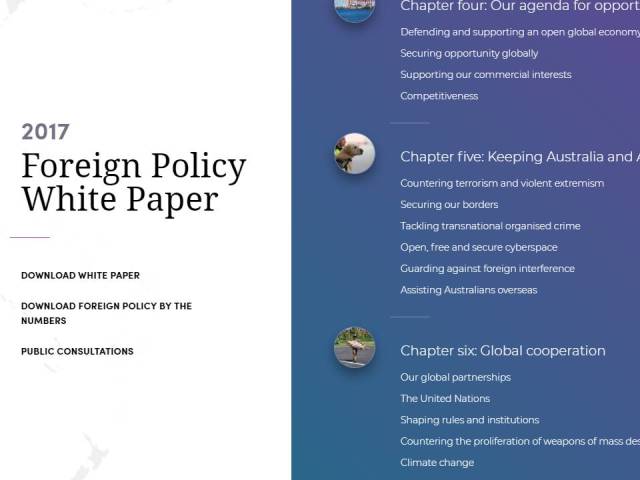 "The White Paper is useful as a contemporary statement of mainstream Australian thinking on Australia’s position in the world"
"The White Paper is useful as a contemporary statement of mainstream Australian thinking on Australia’s position in the world"
[Excerpt from an article which appears in the latest edition of The Round Table: The Commonwealth Journal of International Affairs]
Overall, the White Paper offers a nuanced assessment of the current state of world politics, with an emphasis on issues that concern Australia. It does not envisage a general collapse of world politics, but highlights significant challenges in relation to geopolitics, economics and the ‘new international agenda’. In assessing the White Paper, the focus here is on key issues in Australian strategy in relation to each of these broad areas, with reference also to issues concerning Australia’s involvement in its immediate neighbourhood. In relation to the geopolitical dimension a key issue for Australia is the ‘rise’ of China, and the impact of this situation on the US role in the region.
The recommended strategy for Australia in the White Paper is hedging, pursuing ‘constructive relations’ with China, while concurrently strengthening the alliance with the US; soft balancing involving alignments with India, Japan and South Korea is also an element of this strategy. The question is whether this strategy is sufficient for a situation where it appears that China will inevitably become the strongest power in the region. Should Australia be more actively pursuing accommodation with China, as advocated by Hugh White (2017), for example?
Part of the problem also is that Australia (the White Paper being representative in this regard) continues to put a strong emphasis on the US alliance as the linchpin of its security. Trumpism might be taken as indicative of one challenge in this regard – and President Trump is not necessarily a passing phenomenon given that he represents an important political current in the US. It is also the case that the US relative to other powers is declining in influence, not just in the Asia-Pacific or Indo-Pacific, but globally. It appears that it would be judicious for Australia to hedge its bets, maintaining a strong relationship with the US and developing its relationships with various Asian powers, but also putting more emphasis on cooperation with China. Force of circumstance will make Australia more independent of the US than it has been over the past 80 years. Australia can attempt to encourage US–China cooperation in relation to economic and security matters but is only a minor factor in this regard. With the specific issue of North Korea, the focus of the White Paper is on the threat posed by that country’s development of nuclear weapons and long-range missiles. While advocating cooperation with Australia’s partners ‘to bring increasing pressure to bear on North Korea to end its dangerous behaviour’, primarily through sanctions, there is little appreciation of the political dynamics of the Korean unification issue and North Korea’s concern for its security. More emphasis on the political context would suggest a strategy for engaging North Korea that took account of concerns about military developments, but with reference to all the issues that are relevant.
Although it is difficult to determine at this point whether significant change will occur, the initiation of talks between North and South Korea in January 2018 suggested an alternative strategy (or perhaps a complementary one) to that proposed in the White Paper. This approach has been taken further with the meeting between the leaders of the two Koreas (Kim Jong Un of North Korea and President Moon Jae In of South Korea) on 27 April 2018; the proposed meeting between Kim and President Trump is still to come at the time of writing.
The assessment of the global economic situation is perhaps overly sanguine in relation to growing economic nationalism and trade tensions. Trumpism is a major factor in the latter regard, contributing to tensions in Sino–US relations, undermining the TPP, and raising issues also in North America with the renegotiation of the North American Free Trade Agreement (NAFTA). Authoritarian political developments associated with populism might have received more attention (Turkey, east-central Europe, possibly the Philippines, for example). Nevertheless, it is difficult to take issue with the recommended strategy that Australia should support an open global economy, be active in the major forums of global economic governance, and pursue bilateral and regional FTAs, most notably the TPP and RCEP.
[Derek McDougall is based at the Department of Social and Political Sciences at the University of Melbourne].



